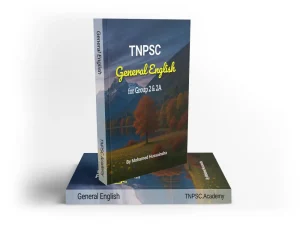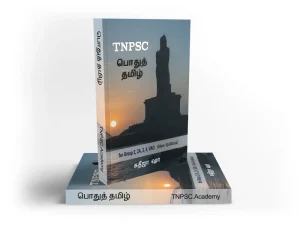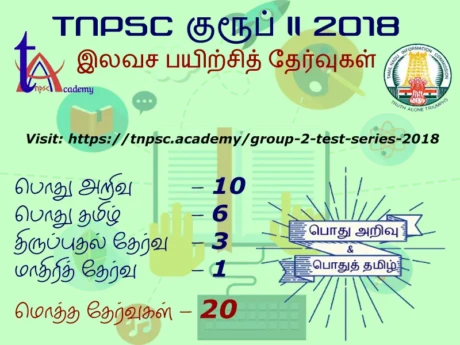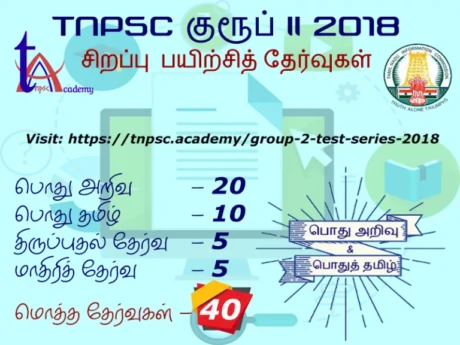TNPSC Books
-
TNPSC General English Book - for Group 2 & 2A
₹1,000.00Original price was: ₹1,000.00.₹850.00Current price is: ₹850.00. -
TNPSC பொதுத் தமிழ் Book - for Group 2, 2A, 3, 4 & VAO
₹1,000.00Original price was: ₹1,000.00.₹850.00Current price is: ₹850.00.
Group 1 Courses
TNPSC Group 1 - Test Series - 2019
4.7₹3,500.00Original price was: ₹3,500.00.₹2,800.00Current price is: ₹2,800.00. 541Group 1 | Postal and Online Test Series | 2022
₹3,200.00Original price was: ₹3,200.00.₹2,800.00Current price is: ₹2,800.00. 88
Group 2 & 2A Courses
TNPSC Group 2 and 2A - Test Series - 2019 - தமிழ்
₹2,400.00Original price was: ₹2,400.00.₹1,800.00Current price is: ₹1,800.00. 175TNPSC Group 2 and 2A - Test Series - 2019
₹2,400.00Original price was: ₹2,400.00.₹1,800.00Current price is: ₹1,800.00. 527














www.tnpsc.academy – TNPSC Current Affairs October 24, 2020 (24/10/2020)
Topic: International Events
Chair of ILO Governing Body: India
After 35 years, India has assumed the Chairmanship of the Governing Body of International Labour Organization (ILO).
Key facts:
Labour & Employment Secretary Apurva Chandra has been elected as the Chairperson of the Governing Body of the ILO for the period October 2020-June 2021.
The Chairperson of the Governing Body of ILO is a position of international repute. The Governing Body (GB) is the apex executive body of the ILO.
GB meets thrice a year, in March, June and November. It takes decisions on ILO policy, decides the agenda of the International Labour Conference, adopts the draft programme and budget of the organisation for submission to the conference, and elects the Director-General.
The broad policies of the ILO are set by the International Labour Conference, which meets once a year in June, in Geneva, Switzerland.
Chandra will be presiding over the upcoming Governing Body’s meeting, to be held in November 2020.
It will provide a platform to apprise participants of the transformational initiative taken by the government in removing the rigidities of the labour market, besides making intention clear about the universalisation of social security to all workers in the organised or unorganised sector.
The four codes on wages, industrial relations, social security and occupational safety, health and working conditions are expected to improve ease of doing business and safeguard the interest of workers.
International Labour Organization:
The only tripartite United Nations (UN) agency, since 1919, the ILO brings together governments, employers and workers of 187 member States, to set labour standards, develop policies and devise programmes promoting decent work for all women and men.
The ILO became the first specialized agency of the UN in 1946. The principal means of action in the ILO is the setting up the International Labour Standards in the form of Conventions and Recommendations.
India and ILO:
India, a Founding Member of the ILO, has been a permanent member of the ILO Governing Body since 1922. The first ILO Office in India started in 1928.
_
Topic: Economic Policies in India
Forex Reserves
According to the Reserve Bank of India (RBI) data, the country’s foreign exchange (forex) reserves touched a lifetime high of USD 555.12 billionafter it surged by USD 3.615 billion in the week ended 16th October 2020.
Key facts:
Reason Behind the Increase:
The rise in total reserves was due to a sharp rise in Foreign Currency Assets (FCAs),a major component of the overall reserves. FCA jumped by USD 3.539 billion to USD 512.322 billion.
Foreign Exchange Reserves:
Foreign exchange reserves are assets held on reserve by a central bank in foreign currencies, which can include bonds, treasury bills and other government securities. It needs to be noted that most foreign exchange reserves are held in U.S. dollars.
These assets serve many purposes but are most significantly held to ensure that the central bank has backup funds if the national currency rapidly devalues or becomes altogether insolvent.
India’s Forex Reserves include:
Foreign Currency Assets
Gold
Special Drawing Rights
Reserve position with the International Monetary Fund (IMF)
_
Topic: Historical Diary of Events
Birth Anniversary of APJ Abdul Kalam
Recently, the Union Education Minister has launched the Kalam Program for Intellectual Property Literacy and Awareness Campaign (KAPILA) on the occasion of the 89th birth anniversary of Dr APJ Abdul Kalam. He was born on 15th October 1931.
KAPILA:
Under this campaign, students pursuing education in higher educational institutions will get information about the correct system of application process for patenting their invention.
Students in higher education institutions of the country are innovating constantly under the guidance of their teachers but they are not aware of the system of filing its patent.
Through this campaign, students will be able to get benefits from their inventions by patenting them.
For India to become a USD 5 trillion economy by 2024-25, students and scientists have to be more aware of protecting intellectual property (IP).
The program will facilitate the colleges and institutions to encourage more and more students to file patents and everyone engaged in research and development must apply to preserve and safeguard their inventions.
_
Topic: Latest Diary of Events
International Snow Leopard Day – 23rd October
International Snow Leopard Day is observed on 23rd October. It aims to raise awareness on conservation and protection of snow leopards.
Background: International Snow Leopard Day came into being on 23rd October, 2013, with the adoption of the Bishkek Declaration by 12 countries on the conservation of snow leopards.
The 12 countries included, India, Nepal, Bhutan, China, Mongolia, Russia, Pakistan, Afghanistan, Kyrgyzstan, Kazakhstan, Tajikistan, and Uzbekistan.
_
Topic: Places in News, Profile of States
Seagrass
Recently, the restoration process of seagrasses has been taken up by Tamil Nadu in the Gulf of Mannar.
Seagrasses:
These are flowering plants that grow submerged in shallow marine waters like bays and lagoons. These have tiny flowers and strap-like or oval leaves.
Evolution: Terrestrial plants evolved about 850 million years ago from a group of green algae and seagrasses evolved from terrestrial plants that recolonised the ocean 70-100 million years ago.
Food Production:
Like terrestrial plants, seagrasses also require sunlight for photosynthesis from which these manufacture their own food and release oxygen.
Habitat:
Though seagrasses inhabit all types of substratas (layers) from mud to rock, the lush green seagrass beds are found extensively in muddy and sandy substratas.
These occur all along the coastal areas of India and are abundant in the Palk Strait and Gulf of Mannar in Tamil Nadu.
_
Topic: Historical Diary of Events
Sir Syed’s Day
Sir Syed’s Day is observed on 17th October to mark the birth anniversary of Sir Syed Ahmad Khan.
Key facts:
Sir Syed Ahmad Khan was born in 1817 in a family that was close to the Mughal court, he was a man of many distinctions, a civil servant, journalist, educationist, social reformer and historian among others. He served the British administration before the revolt of 1857.
He has also written a pamphlet titled “The Causes of the Indian Revolt” to explain the reasons for the revolt from a Indian perspective. Sir Syed is, first and foremost, known for his pioneering role in transforming the educational opportunities for Muslims.
Sir Syed realised that Muslims could only make progress if they took to modern education. For this he started the Aligarh movement.
Social Reformer: He also pushed for social reforms and was a champion of democratic ideals and freedom of speech.
He was against religious intolerance, ignorance and irrationalism. He denounced purdah, polygamy and easy divorce.
_
Topic: India and its Foreign Relations
India launches flash flood guidance services for South Asia
India has launched first of its kind Flash Flood Guidance services for India and other South Asian countries — Bangladesh, Bhutan, Nepal, and Sri Lanka.
Under this, IMD will issue impact-based forecasting at the watershed and also city level, of floods which are very sudden and of short duration.
About the Flash Flood Guidance:
It is a robust system designed by the India Meteorological Department (IMD) to provide the necessary products in real-time to support the development of warnings for flash floods about 6-12 hours in advance at the watershed level with a resolution of 4kmx4km for the Flash Flood prone South Asian countries — India, Nepal, Bhutan, Bangladesh, and Sri Lanka.
Why IMD?
Recognizing that flash floods have a particularly disastrous impact on lives and properties of the affected populations, the Fifteenth WMO Congress had approved the implementation of a Flash Flood Guidance System (FFGS) project with global coverage.
This was developed by the WMO Commission for Hydrology jointly with some others.
Further, WMO has entrusted India with the responsibility of Regional Centre of South Asia Flash Flood Guidance System for coordination, development, and its implementation.
What are Flash floods?
They are highly localized events of short duration with a very high peak and usually have less than six hours between the occurrence of the rainfall and peak flood.